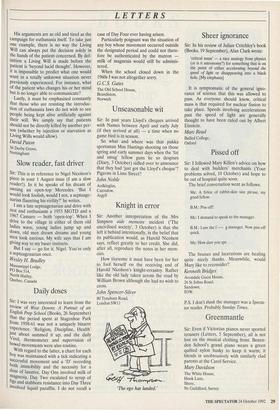The will of the living
Sir: Ludovic Kennedy mischievously implies in his article ('What would they have done?', 26 September) that support for euthanasia has come about mainly in the last 20 years, and is chiefly due to the ageing population in Europe. In this he is quite wrong.
In actual fact the Advance Directive (Liv- ing Will) was first proposed by a Dr Charles Millard in 1931 and the first Bill aimed at legalising euthanasia came before Parlia- ment in 1936. Enthusiasm subsequently waned in the face of the Nazi euthanasia programme which killed 70,000 disabled people and which started off under the euphemism 'mercy killing'. His arguments are as old and tired as the campaign for euthanasia itself. To take just one example, there is no way the Living Will can always put the decision solely in the hands of the patient concerned. By def- inition a Living Will is made before the Patient is 'beyond lucid thought'. However, it is impossible to predict what one would want in a totally unknown situation never Previously experienced. For instance, what of the patient who changes his or her mind but is no longer able to communicate?
Lastly, it must be emphasised constantly that those who are resisting the introduc- tion of euthanasia laws do not wish to see people being kept alive artificially against their will. We simply say that patients Should not be directly killed by another per- son (whether by injection or starvation as Living Wills would allow).
David Paton
56 Derby Grove, Nottingham



































































 Previous page
Previous page